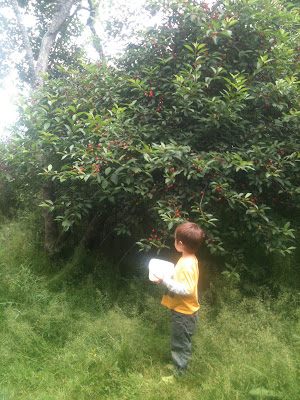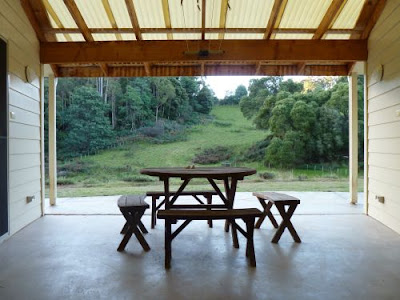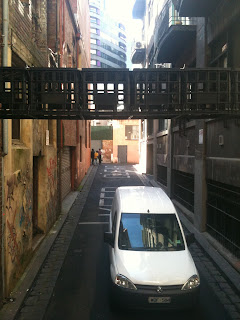Last Wednesday, Farmdoc and I visited the Museum of Old and New Art (MONA), Hobart's controversial new art gallery designed by Nonda Katsalidis. I've been dying to go but this was our first visit to Hobart since the museum opened in January.
The whole visit is an experience, from having to walk across a tennis court to get to the entrance, and being greeted at the door and herded into a group to have the O thingies (more about those in a minute) explained and demonstrated.
The building is reputed to have cost over $100 million and is owned by David Walsh, who apparently earned his vast fortune from gambling. Well, better him than the casinos and their rapacious owners, I say.
From the entrance we headed down a staircase that encircles a glass elevator and plunges down into sandstone cliff. At the bottom of the steps we were met by a bar and a long line of seating that looks like it belongs in someone's formal sitting room. Bewildering, to say the least.
The art. Where to start? There's so much, and it's arranged in apparently no order, all chosen and arranged by Walsh according to his taste and whim. There are also no signs on the walls, not even the names of the work or the artists. You press a button on the O - an mp3 player you are now wearing around your neck - and up come pictures of the art nearest you, complete with details. Pressing further buttons lets you read reviews or explanations of the piece and sometimes there's audio, which you play through head phones. This can be interviews with the artist or just a piece of music to look at the art by.
When I tried to decide what the highlights had been, it felt impossible - it's all highlights. Sydney Nolan's vast Snake; ancient Egyptian tombs; Chris Ofili's controversial The Holy Virgin Mary; work by Damien Hirst, Brett Whitely, Juan Davila, Marina Abrimovic
. How do I remember all this? I don't. When I got home I received an email setting out all the works I'd seen, as recorded by my O, and a list of all that I'd missed.
Farmdoc and I spent four hours there, including 30 minutes for coffee and a vegie baguette in the cafe on the top (ground floor) level. It was a little disconcerting to eat the same food we'd seen fed to 'Cloaca' earlier.
'Cloaca' is a room-sized digestive machine by Dutch artist, Wim Delvoye. It turns food that is fed in at one end through a garbage disposal into faeces that are excreted at the other end via a series of large glass containers. I think it has to do with demonstrating the pointlessness of life. We watched the thing being 'fed' at 11.00 but we didn't return at 2.00 for the defecation. I've seen enough poo in my day. I think I'd be more impressed by a machine that can clean it up. Still it is a spectacle.
And that seems to be the point - spectacle. It's art as spectacle, like a rich kid's toy box - the excess leaves you dazzled and dazed. It's Australia's largest private museum and it's stuffed full.
We emerged into the daylight, dizzy with all we'd seen and felt. Amazed, entertained and spat out.
There's no committee that chooses the art - it's all David Walsh's taste - and I felt very aware of that. The individual pieces don't actually have much opportunity to shock or inform. There's too much.
Overall I think it's amazing. The gallery is set in the grounds of the Moorilla Winery on the bank of the Derwent, with lovely views across the river. You can stay there too: there are four quite stunning one- and two-bedroom pavilions. There's an upmarket restaurant and a wine bar as well as the cafe, and beanbags are spread out over a large lawn area, so you can relax with a glass of wine in the fresh air and recover from your subterranean adventure.
Entry to MONA is free - at least for the moment. There's talk of charging in the future though.
For all my misgivings I'd definitely recommend a visit or three. Hobart's such a pretty city and you can take a ferry to the gallery, enjoy a day there, and then eat at one of the many restaurants around town in the evening.
Farmdoc and I will be back in Hobart in a couple of months and I'll definitely be returning to MONA. You shouldn't miss it.
























































